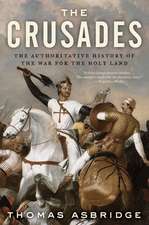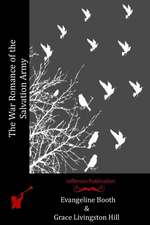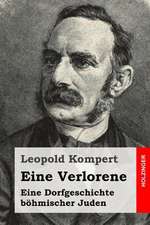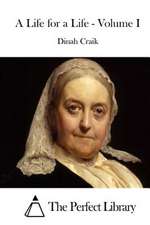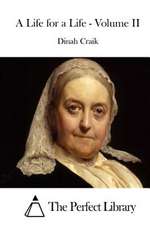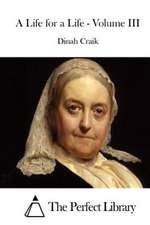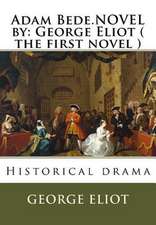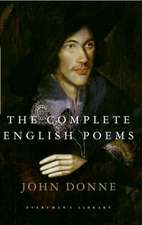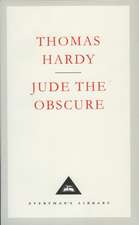Middlemarch: Everyman's Library Classics & Contemporary Classics, cartea 6
Autor George Eliot, Eric Shaffert E. S. Shafferen Limba Engleză Hardback – 30 sep 1991 – vârsta de la 14 până la 18 ani
Introduction by E. S. Shaffer
(Book Jacket Status: Not Jacketed)
Din seria Everyman's Library Classics & Contemporary Classics
- 8%
 Preț: 562.39 lei
Preț: 562.39 lei -
 Preț: 132.00 lei
Preț: 132.00 lei -
![Les Miserables [With Ribbon Marker]](https://i2.books-express.ro/bs/9780375403170/les-miserables-with-ribbon-marker.jpg) Preț: 282.88 lei
Preț: 282.88 lei -
 Preț: 169.01 lei
Preț: 169.01 lei -
 Preț: 253.69 lei
Preț: 253.69 lei -
 Preț: 172.02 lei
Preț: 172.02 lei -
 Preț: 129.73 lei
Preț: 129.73 lei -
 Preț: 155.68 lei
Preț: 155.68 lei -
 Preț: 176.42 lei
Preț: 176.42 lei -
 Preț: 141.92 lei
Preț: 141.92 lei -
 Preț: 121.47 lei
Preț: 121.47 lei -
 Preț: 192.29 lei
Preț: 192.29 lei -
 Preț: 190.50 lei
Preț: 190.50 lei -
 Preț: 152.82 lei
Preț: 152.82 lei -
 Preț: 156.56 lei
Preț: 156.56 lei -
 Preț: 239.56 lei
Preț: 239.56 lei -
 Preț: 218.89 lei
Preț: 218.89 lei -
 Preț: 140.00 lei
Preț: 140.00 lei -
 Preț: 159.81 lei
Preț: 159.81 lei -
 Preț: 286.18 lei
Preț: 286.18 lei -
 Preț: 179.05 lei
Preț: 179.05 lei - 8%
 Preț: 439.96 lei
Preț: 439.96 lei -
 Preț: 291.22 lei
Preț: 291.22 lei -
 Preț: 154.68 lei
Preț: 154.68 lei -
 Preț: 187.87 lei
Preț: 187.87 lei -
 Preț: 254.91 lei
Preț: 254.91 lei -
 Preț: 155.09 lei
Preț: 155.09 lei -
 Preț: 217.78 lei
Preț: 217.78 lei -
 Preț: 144.97 lei
Preț: 144.97 lei -
 Preț: 253.60 lei
Preț: 253.60 lei -
 Preț: 230.77 lei
Preț: 230.77 lei -
 Preț: 277.35 lei
Preț: 277.35 lei -
 Preț: 181.90 lei
Preț: 181.90 lei -
 Preț: 129.71 lei
Preț: 129.71 lei -
 Preț: 182.83 lei
Preț: 182.83 lei -
 Preț: 177.11 lei
Preț: 177.11 lei -
 Preț: 162.49 lei
Preț: 162.49 lei -
 Preț: 155.68 lei
Preț: 155.68 lei -
 Preț: 194.89 lei
Preț: 194.89 lei -
 Preț: 158.19 lei
Preț: 158.19 lei -
 Preț: 155.90 lei
Preț: 155.90 lei -
 Preț: 229.46 lei
Preț: 229.46 lei -
 Preț: 180.40 lei
Preț: 180.40 lei -
 Preț: 181.46 lei
Preț: 181.46 lei -
 Preț: 156.31 lei
Preț: 156.31 lei -
 Preț: 138.16 lei
Preț: 138.16 lei -
 Preț: 126.43 lei
Preț: 126.43 lei -
 Preț: 201.04 lei
Preț: 201.04 lei -
 Preț: 142.93 lei
Preț: 142.93 lei -
 Preț: 183.26 lei
Preț: 183.26 lei
Preț: 203.04 lei
Nou
Puncte Express: 305
Preț estimativ în valută:
38.85€ • 40.48$ • 32.17£
38.85€ • 40.48$ • 32.17£
Carte disponibilă
Livrare economică 13-27 martie
Preluare comenzi: 021 569.72.76
Specificații
ISBN-13: 9780679405672
ISBN-10: 0679405674
Pagini: 936
Dimensiuni: 135 x 206 x 45 mm
Greutate: 0.85 kg
Editura: Everyman's Library
Seria Everyman's Library Classics & Contemporary Classics
ISBN-10: 0679405674
Pagini: 936
Dimensiuni: 135 x 206 x 45 mm
Greutate: 0.85 kg
Editura: Everyman's Library
Seria Everyman's Library Classics & Contemporary Classics
Notă biografică
Mary Ann Evans was born on November 22, 1819, at Chilvers Coton, Warwickshire, England, the last child of an estate agent. During her girlhood, she went through a phase of evangelical piety, but her strong interest in philosophy and her friendship with religious freethinkers led to a break with orthodox religion. When one of these friends married in 1843, Mary Ann took over from his wife the task of translating D.F. Strauss’s The Life of Jesus Critically Examined (1846), a work that had deep effect on English rationalism. After her father’s death she settled in London and from 1851 to 1854 she served as a writer and editor of the Westminster Review, the organ of the Radical party. In London she met she met George Henry Lewes, a journalist and advanced thinker. Lewes was separated from his wife, who had had two sons by another man, but had been unable to obtain a divorce. In a step daring for Victorian times, Mary Ann Evans began living openly with Lewes in 1854, in a union they both considered as sacred as a legal marriage and one that lasted until his death in 1878.
With Lewes’s encouragement, Mary Ann Evans wrote her first fictional work, “The Sad Fortunes of the Reverend Amos Barton,” for Blackwood’s Magazine in 1857; it was followed by two more stories published under the pseudonym George Elliot–“George” because it was Lewes’s name and “Eliot” because, she said, it was good mouth-filling, easily pronounced word.” At the age of thirty-nine she used her memories of Warwickshire to write her first long novel, Adam Bede (1859), a book that established her as the foremost woman novelist in her day. Then came The Mill on the Floss (1860), Silas Marner (1861), and Romola (1863). Her masterpiece and one of the greatest English novels, Middlemarch, was published in 1871-72. Her last work was Daniel Deronda (1876). After Lewes’s death George Eliot married John Walter Cross. He was forty; she was sixty-one. Before her death on December 22, 1880, she had been recognized by her contemporaries as the greatest living writer of English fiction.
From the Paperback edition.
With Lewes’s encouragement, Mary Ann Evans wrote her first fictional work, “The Sad Fortunes of the Reverend Amos Barton,” for Blackwood’s Magazine in 1857; it was followed by two more stories published under the pseudonym George Elliot–“George” because it was Lewes’s name and “Eliot” because, she said, it was good mouth-filling, easily pronounced word.” At the age of thirty-nine she used her memories of Warwickshire to write her first long novel, Adam Bede (1859), a book that established her as the foremost woman novelist in her day. Then came The Mill on the Floss (1860), Silas Marner (1861), and Romola (1863). Her masterpiece and one of the greatest English novels, Middlemarch, was published in 1871-72. Her last work was Daniel Deronda (1876). After Lewes’s death George Eliot married John Walter Cross. He was forty; she was sixty-one. Before her death on December 22, 1880, she had been recognized by her contemporaries as the greatest living writer of English fiction.
From the Paperback edition.
Extras
WHO that cares much to know the history of man, and how the mysterious mixture behaves under the varying experiments of Time, has not dwelt, at least briefly, on the life of Saint Theresa,' has not smiled with some gentleness at the thought of the little girl walking forth one morning hand - in - hand with her still smaller brother, to go and seek martyrdom in the country of the Moors? Out they toddled from rugged Avila, wide - eyed and helpless - looking as two fawns, but with human hearts, already beating to a national idea; until domestic reality met them in the shape of uncles, and turned them back from their great resolve. That child - pilgrimage was a fit beginning. Theresa's passionate, ideal nature demanded an epic life: what were many - volumed romances of chivalry and the social conquests of a brilliant girl to her. Her flame quickly burned up that light fuel; and, fed from within, soared after some illimitable satisfaction, some object which would never justify weariness, which would reconcile self - despair with the rapturous consciousness of life beyond self. She found her epos in the reform of a religious order.
That Spanish woman who lived three hundred years ago was certainly not the last of her kind. Many Theresas have been born who found for themselves no epic life wherein there was a constant unfolding of far - resonant action; perhaps only a life of mistakes, the offspring of a certain spiritual grandeur ill - matched with the meanness of opportunity; perhaps a tragic failure which found no sacred poet and sank unwept into oblivion. With dim lights and tangled circumstance they tried to shape their thought and deed in noble agreement; but after all, to common eyes their struggles seemed mere inconsistency and formlessness; for these later - born Theresas were helped by no coherent social faith and order which could perform the function of knowledge for the ardently willing soul. Their ardour alternated between a vague ideal and the common yearning of womanhood; so that the one was disapproved as extravagance, and the other condemned as a lapse.
Some have felt that these blundering lives are due to the inconvenient indefiniteness with which the Supreme Power has fashioned the natures of women: if there were one level of feminine incompetence as strict as the ability to count three and no more, the social lot of women might be treated with scientific certitude. Meanwhile the indefiniteness remains, and the limits of variation are really much wider than any one would imagine from the sameness of women's coiffure and the favourite love - stories in prose and verse. Here and there a cygnet is reared uneasily among the ducklings in the brown pond, and never finds the living stream in fellowship with its own oary-footed kind. Here and there is born a Saint Theresa, foundress of nothing, whose loving heart -beats and sobs after an unattained goodness tremble off and are dispersed among hindrances, instead of centering in some long recognisable deed.
From the Trade Paperback edition.
That Spanish woman who lived three hundred years ago was certainly not the last of her kind. Many Theresas have been born who found for themselves no epic life wherein there was a constant unfolding of far - resonant action; perhaps only a life of mistakes, the offspring of a certain spiritual grandeur ill - matched with the meanness of opportunity; perhaps a tragic failure which found no sacred poet and sank unwept into oblivion. With dim lights and tangled circumstance they tried to shape their thought and deed in noble agreement; but after all, to common eyes their struggles seemed mere inconsistency and formlessness; for these later - born Theresas were helped by no coherent social faith and order which could perform the function of knowledge for the ardently willing soul. Their ardour alternated between a vague ideal and the common yearning of womanhood; so that the one was disapproved as extravagance, and the other condemned as a lapse.
Some have felt that these blundering lives are due to the inconvenient indefiniteness with which the Supreme Power has fashioned the natures of women: if there were one level of feminine incompetence as strict as the ability to count three and no more, the social lot of women might be treated with scientific certitude. Meanwhile the indefiniteness remains, and the limits of variation are really much wider than any one would imagine from the sameness of women's coiffure and the favourite love - stories in prose and verse. Here and there a cygnet is reared uneasily among the ducklings in the brown pond, and never finds the living stream in fellowship with its own oary-footed kind. Here and there is born a Saint Theresa, foundress of nothing, whose loving heart -beats and sobs after an unattained goodness tremble off and are dispersed among hindrances, instead of centering in some long recognisable deed.
From the Trade Paperback edition.
Recenzii
"No Victorian novel approaches Middlemarch in its width of reference, its intellectual power, or the imperturbable spaciousness of its narrative."
--V. S. Pritchett
From the Trade Paperback edition.
--V. S. Pritchett
From the Trade Paperback edition.
Descriere
With sure and subtle touch, Eliot paints a luminous and spacious landscape of life in a provincial town, interweaving her themes with a proliferation of characters: an innocent idealist; a self-defeated young doctor; a naive young woman; and a cold man, who "lives too much with the dead".

